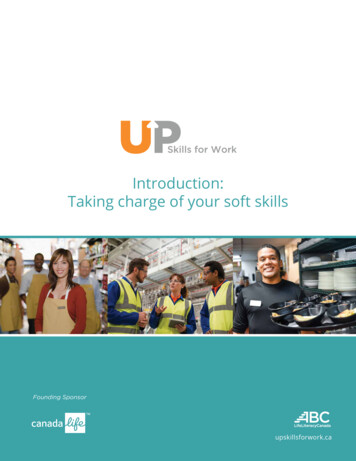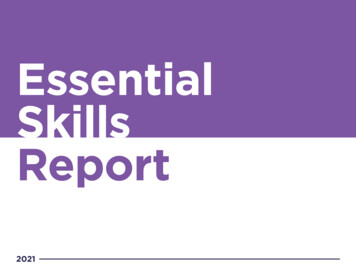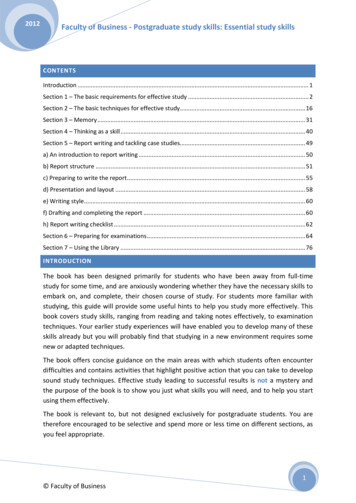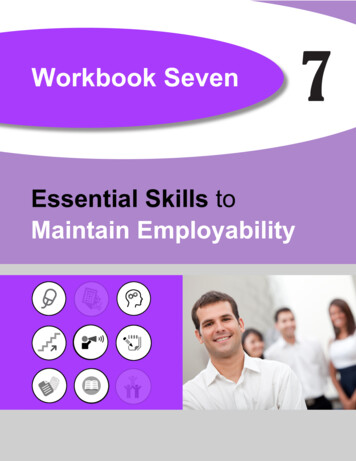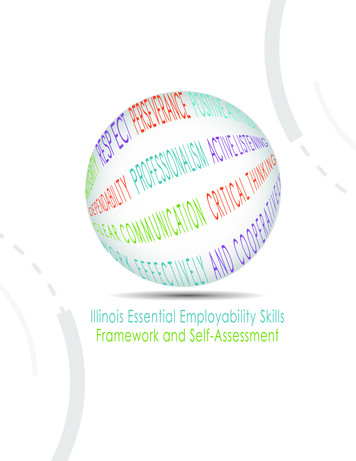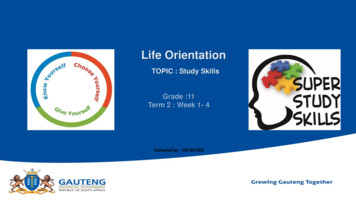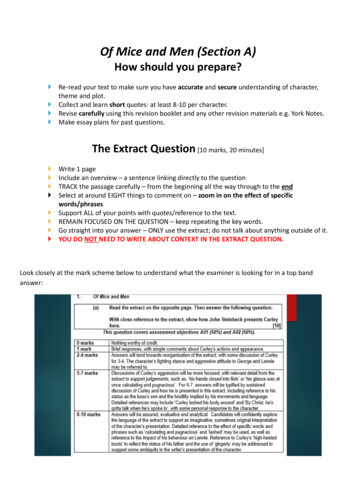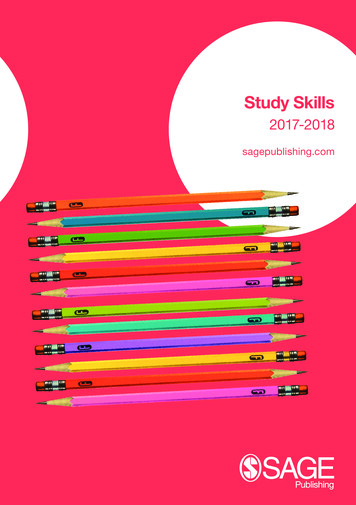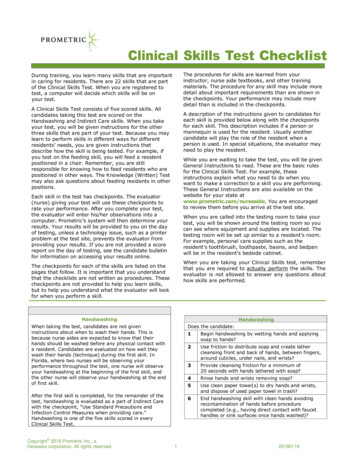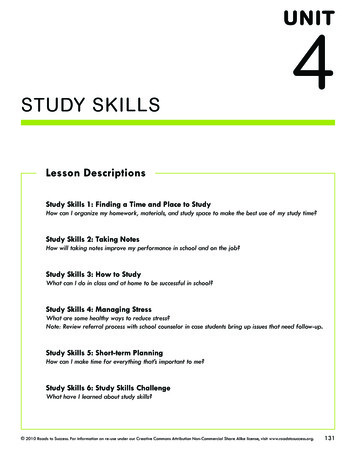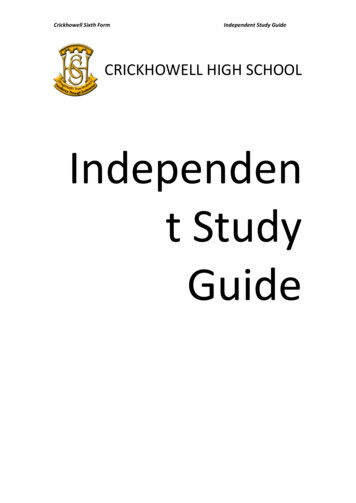
Transcription
Crickhowell Sixth FormIndependent Study GuideCRICKHOWELL HIGH SCHOOLIndependent StudyGuide
Crickhowell Sixth FormIndependent Study GuideContentsIntroduction Page 1Preparing for University Page 2Essential Study Skills Page 2Reading and Noting Page 3Taking Notes Page 5Resources Page 6Group Discussions Page 9Essay Writing Page 9Effective Study and Revision Techniques Page 11Conclusion Page 12Subject Specific Guidance Page 13IntroductionChanges to the A Level specifications in September 2008 emphasised howimportant independent study skills have become. Students will not achievetheir potential if they do not put in the work outside of the lesson.Assessment frequently asks students to apply their subject knowledge tounfamiliar contexts and it is difficult, if not impossible, to do this if you havenot taken the time to extend your understanding independently.Our students spend only a limited amount of timein lessons School Day 38/52 weeks in the year5/7 days in every week4/24 hours in every day This adds up to approximately 8% of theirtime. Which leaves 92% outside teachercontact time. How do they use this time to learn? Itmakes a BIG difference.This booklet aims to explain how to make the most of this time to achievesuccess.LessonsStudy PeriodsRegistrationLunch Break
Crickhowell Sixth FormIndependent Study GuidePreparing for UniversityA Levels are intended to prepare students for undergraduate study and it isclear that if you can develop these independent study skills during your timein the Sixth Form, you will begin university with a head start. However, morethan that, acquiring these skills will actually improve your chances of gaininga place at that university in the first place.It is predicted that 40,000 students will achieve three A grades in their ALevel results in 2010. This is one in every ten students and these 40,000form the pool from which the most selective universities will recruit.Ultimately, there are more students competing for fewer places with bettergrades. Although there are over 55,000 courses available through UCAS, themajority of AAA candidates compete to get onto only 1500 of them. Thismeans that there are approximately 26 AAA candidates competing for everyone place; and for many courses this can rise to 200 – 300 applicantscompeting for every place.So what does this mean for sixth formers? Basically, AAA is not enough anymore for these most competitive courses. Students need to be developingthe independent study skills described in this booklet. Most importantly, theymust be reading and pursuing activities beyond the A Level syllabus; theuniversities call these ‘Supercurricular Activities’ and they are more highlyprized than extracurricular activities.Oxford talks about the 3 Rs – reading, reading and reading! The Head ofStudent Recruitment describes it as ‘Sunday Afternoon Syndrome’. When youhave finished all your school commitments, done your part time job etc, whatdo you do? Watch Glee? Top Gear? Students who receive offers from themost competitive courses will be pursuing their academic interest. They areintrinsically motivated and engaged. In addition, the majority of theseresources are available for free – they are online or on ‘freeview’. They areyour local libraries, museums; or even your local river or mountain. It is notan extensive home library or a trip to the Galapagos Islands.However, this work must be outside the A Level syllabus – otherwise it justtells admissions tutors that you are good at doing what you are told! It isalso important that you read critically. Many students are critical of a copy ofHeat magazine or an episode of Big Brother but accept a broadsheet opinionpiece at face value. So, in conclusion, if you are aiming for one of thesecourses, this kind of studying should be a pleasure not a chore!Essential Study Skills for the Sixth FormWhat follows is an introduction to the essential study skills you will need inthe Sixth Form. The exact study skills you will need to develop will bedependent on the subjects you are studying and your own strengths and
Crickhowell Sixth FormIndependent Study Guideweaknesses. It is difficult to generalise about study skills, and you will need towork with your tutor and teachers to find your most effective approach tostudy. However, the section begins with ten top tips that everyone can follow!1. Get yourself organised – keep your planner up to date, listing work set,work completed and work outstanding.2. Try and stick to a regular work rota: do a little bit of study often,rather than leaving huge amounts of work to the eleventh hour before adeadline. Late work is invariably rushed, often incomplete, and of inferiorquality, and by starting an assignment well in advance of a deadline you willget the chance to ask staff for help if you need it. Most ‘A’ level students needto work for between 14 and 16 hours per week OUTSIDE of lessons.3. Work in a studious environment, not somewhere where you will bedistracted. At home, work somewhere where you will not be disturbed (andwhere you can leave books and folders safely). If you do need to work on acomputer, make sure you are not signed into any social networking sites(MSN, Facebook) to avoid distractions.4. Define your work tasks. Make sure you understand what is expected ofyou. Seek clarification if you are uncertain about essay titles, the parametersof note taking, etc.5. Don’t be afraid to ask for help when you need it!. Don’t suffer in silenceand don’t pretend you understand something when you DO NOT.6. Use all the available resources: teachers; textbooks; libraries;periodicals; the Internet; newspapers; television and radio; fellow students.7. Motivate yourself. Have a goal to aim for on a micro scale a favouriteTV programme in half an hour after some revision; on a longer scale auniversity grade offer.8. Work in attention span units. Few students can work effectively formore than one hour before their concentration starts to ebb (this isparticularly so with revision). Divide your working time up into attention spanunits (40-60 minutes) punctuated by short breaks.9. Get a dictionary! Many exam boards now penalise poor spelling andgrammar at ‘A’ level.10. The more you put in, the more you get out, both in terms of resultsand enjoyment.
Crickhowell Sixth FormIndependent Study GuideReading and NotingReading is one of the core activities of studying. At A level you are faced withthree particular challenges: The volume of reading The complexity of the material you will read Trying to remember what you have read.1. A Reading StyleSkilled readers vary their reading speed and method to suit both the materialthey are reading and their purpose in reading it. You ‘read’ a telephonedirectory rather differently than a novel.There are several differentapproaches to reading. Here are some of the main techniques you can use: Skimming: this involves looking quickly through the book and reading onlythings like contents, headings, introductions and conclusions. It is a quick andefficient way of familiarising yourself with a publication and is useful if youwish to check whether a book is relevant, or for finding particular informationor ideas quickly. Skimming is particularly useful for finding your way around apublication. You may skim the newspaper to find the articles you want toread, or a textbook to identify a relevant chapter. Scanning: this is a very rapid search for important points. It may be adiagram, a title or a key word. The essential thing is that you deliberatelyignore everything except the one item for which you are scanning. Scanningis useful when you want to identify a particular piece of information – forexample some specific chemical formulae. Reading to understand: this involves detailed study of a chapter,passage or article in order to absorb all the major facts and ideas. You mayread it more than once, and take notes to summarise what you have read.Reading to understand is useful when you want to study somethingthoroughly. Word-by-word reading: very occasionally you actually need to read everyword extremely carefully – for example, when reading an English Literaturetext or an exam question.To study efficiently you must learn to vary your reading style and becomeproficient at each type of reading. By developing the ability to switch fromone method of reading to another you will vastly increase your studyingefficiency.Language DifficultiesReading is more difficult when the author uses technical terms or complexlanguage. In this situation you should never guess meanings, but instead usedictionaries and subject glossaries to help you with definitions.
Crickhowell Sixth FormIndependent Study GuideResponding to the MaterialReading is not a passive activity! You should be thinking about what you read Do you agree with the author? What is the quality of the author’s argument? Do you have a different point of view? What counter arguments could you use?Taking NotesClear accurate and comprehensive notes are vital to ‘A’ level success (Sod’sLaw of Examination states that the topics you failed to note properly are theones you will be examined on!)The Process of Note TakingHighlight and underline texts IF THEY ARE YOUR OWN. Highlighting andunderlining focus your attention on the text and makes you think about whatthe key concepts and issues are.Taking notes forces you to THINK: to grapple with the ideas in the text asyou read them, because you have to decide what to write down and how tosay it. What is more, if you read without taking notes, no matter how goodyour memory, you will find that ideas gradually drift away from you.Notes should: Summarise the main theme of an article/chapter Highlight the key ideas and arguments used List out any important statistics/facts.Notes are best presented in point form or under subheadings with keyideas/points underlined and highlighted. They may contain quotes, BUTBEWARE OF COPYING TOO MUCH NARRATIVE STRAIGHT FROM THE TEXT.Notes should be detailed enough to cover all the relevant material in a depthnecessary for ‘A’ level study, but not too detailed to make revision arduousand overly time consuming. Notes can be made more concise by the use ofabbreviations.Good notes are invaluable and they act as: A form of ‘external’ memory, a kind of extension to the memory capacityof your mind – enabling you to have ready access to a far wider range ofknowledge. A symbol of progress: notes provide you with evidence of the work youhave done and so make an important contribution to your morale. A means of pulling the course together.Making notes on notes is an effective form of revision. The action of notingconcentrates your mind in revision, and allows you to further order ideas and
Crickhowell Sixth FormIndependent Study Guidesharpen understanding.Filing notes in an ordered fashion is a vital skill. Too many students losenotes or are unable to access material when they need it because of chaoticor non-existent filing systems. Treat yourself to some ring binders and boxfiles!Absence: As with any subject it is vitally important that you have acomprehensive, clear set of notes. Make sure if you are absent from schoolthat you ask someone in your class for a copy of anything you have missed.This is your responsibility, not the teacher’s although of course your teacherwill be more than willing to go through any problems once you have copiedup missed work.ResourcesComputersIncreasingly the ability to use computers is expected in both academic andevery day life. There is no doubt that you are at a disadvantage if you are notcomputer literate to at least some degree of competency. There is a wealth ofinformation out there and the internet offers huge scope for research forprojects and for general interest. However, you should consider the source ofinformation on the web – there is little censorship or vetting of material sohow reliable is the source?Finally, despite their significant advantages, computers present two distinctpitfalls to today’s student:Plagiarism: Copying information from the internet without acknowledging itis plagiarism. You must cite your sources or reference them in a footnote,bibliography or appendix. Failure to do this may result in disqualification fromindividual modules or entire subjects. By all means, get information from thenet but you must digest it and produce your own conclusions in your ownwords as well as citing your sources.Distraction: Social media sites such as MSN, Facebook, Bebo etc are acentral part of teenagers’ lives. Inevitably, they are also a distraction. It isimpossible to concentrate on academic work if you have MSN ‘conversations’and Facebook status updates popping up continuously. To avoid distraction,do not log in to these sites whilst you are studying; use them as a rewardafter a study session. They are enormous drains on your time!TextbooksAgain the use of a textbook depends on the subject. In most subjects, themain use of your textbook is as a source of information and questions onspecific topics. You may be asked to take notes directly from the textbook.
Crickhowell Sixth FormIndependent Study GuideLibrary and Department ResourcesYou would also be well advised to read round your subject. This will help withsuch things as synoptic papers, coursework and research projects. Thesecond half of this booklet has suggestions for further reading.Past PapersThese in some ways are the most valuable study aid you have. After all theyrepresent exactly what it is you will be asked to do in the exam. There is nosubstitute for practising past papers. Go to the exam boards’ websites anddownload the relevant materials.It may well be worth adopting the following strategy:1) identify main topic groups from the syllabus2) work individually through these topics reading relevant notes, tryingrelevant examples from textbooks, asking teachers when unsure3) once you are reasonably confident with that module try a past paper4) the first ones you try need not be under exam conditions – it is then thatyour notes are most useful for referencing specific questions5) Once you are reasonably confident try an exam under test conditions – setaside the allocated time, work in silence on your own and see how it goes.After the allotted time you will still need to go back and fill in any blanks withthe help of friends or teachers but the experience of exam conditions, timepressure etc is extremely useful. It is also important to practise differenttopics and techniques mixed together – often half the battle is identifyingwhich technique will solve the problem before actually going ahead andapplying that technique.One important point to remember is that quality comes before quantity. Yes,you need to practise plenty of past papers but don’t be tempted to rushthrough them missing out the bits you can’t do. There is absolutely no pointin doing say ten past papers if you only do the bits that you could do already.You will have learnt very little. The learning does come partly by doing thepaper and practising techniques but also in the identifying and sorting out ofproblems. That is the long, laborious and difficult part but it is the part thatmeans you will do better next time round.So the main advice is, the more past papers you complete and understandthe better prepared you will be.Teachers and homeworkThere is one huge misconception about homework which a surprising numberof people still cling to. The misconception is this: the reason for completingmy homework is so that the relevant teacher will not moan/contact mytutor/contact my parents/generally make my life unpleasant. That is not thereason for doing homework. There are two main points to homework: firstlyfor the teacher to check that you understand the work and have grasped therelevant concepts and secondly and equally importantly for you topractise required techniques, check you understand the work and have
Crickhowell Sixth FormIndependent Study Guidegrasped the relevant techniques.Copying homework from someone else and passing work off as your ownserves no purpose. Apart from the dishonesty of it, how can a teacher helpwhen they are not seeing your own effort? Don’t fool yourself into thinking,‘Oh yes I could probably have done that myself – I think I understand whatI’m copying.’ If you understand it, then do it yourself. If you don’tunderstand, ask.Be aware that what goes around comes around. Teachers will always bewilling to help you as much as they can but bear in mind they are much morelikely to go that extra mile with you if you meet them half-way. For example,someone who has done no work throughout the year, failed to hand inhomework and generally been apathetic throughout may not be top of thepopularity poll when they have a sudden panic the day before the exam andappear outside the staffroom asking for an intensive revision session. Thinkabout it.In the same vein, don’t be afraid to ask for help with homework – before it isdue in. There is no point on the day homework is due saying ‘Oh, I couldn’tdo these three questions.’ You should have contacted the teacher long beforethen. Similarly, writing the question number and no working does notconstitute a reasonable attempt at a homework question.Do not be under the misapprehension that the homework process finisheswith the handing in of the piece of work. As with past papers, a cruciallyimportant part of the process is sorting out mistakes you have made andlearning from them.To conclude, there are three general golden rules. They are obvious and yetsurprisingly rarely adhered to:1) Slow and steady wins the race – every time. By that I mean studylittle and often – from day one. There is nothing worse than playing catch upand, believe me, although it might have worked at GCSE the ‘I’ll do no workthroughout the year and then make a huge revision effort just before theexams’ technique simply will not work at A-level. Ask the current Year 13 ifyou don’t believe me.2) Divide your time fairly between subjects. It is easy to becomebogged down in a particular subject if there is a test/exam/project looming inthat particular area. You must endeavour however to keep the other subjectsgoing at the same time. No doubt there will be some weekly variations in thedivision of your time between subjects but it is vitally important to keep yourhead above water in all of them at the same time. All too often students getthemselves into a ‘Catch-22’ situation of leaving some subjects, trying tocatch up and in the process neglecting the original subject and so on. It is athankless situation and one to be avoided at all cost. A little forward planning
Crickhowell Sixth FormIndependent Study Guidecan go a long way.3) Seek advice and assistance before things get out of control. Weare here to help. Whether it be subject teacher, tutor, Mrs Thomas or MrClarke – see someone. Let us know you are having difficulties and we willendeavour to help you form a strategy for sorting them out. There are veryrarely problems that are insurmountable provided you are willing to workthrough them.Group DiscussionsIn the Sixth Form you will probably find there is more opportunity for groupdiscussion than was the case at GCSE.Group discussion is important in: Helping you articulate ideas and arguments in a clear coherent fashion Building self confidence Aiding group learning, as you may have novel ideas or a new approachwhich add a different perspective to a topic Learning to appreciate the views of others and the dangers of dogma.How to make group discussions work1. Contribute throw caution to the wind and join in! Everyone hassomething valid to contribute and you have just as much right to take part indiscussions as anyone else.2. Contributions can be simple they don’t have to be complex and brilliant.3. In any discussion you may occasionally grow confused – and unsure ofwhat exactly the discussion is about. Don’t sit quietly by, but instead ask forclarification.4. If a discussion is pre-planned, then prepare for it! Argument backed upwith logic and factual content will always prevail over “hot air”.5. Show tolerance towards the views of others even if you disagree withthem. Many issues are so complex that there is never just one right answer.Essay WritingThere are six key steps:1. Think about the essay titleIn particular look out for command verbs such as explain and evaluate whichwill set the parameters of your answer. Underline key words and ensure thatall aspects of the question are being addressed. Before you begin to preparefor an essay you must have a clear idea of what the question wants, and ifnecessary seek clarification from your teacher.2. Gather together material for the essayLook back through your class notes to find out what is relevant to the
Crickhowell Sixth FormIndependent Study Guidequestion set. Find out from your teacher what extra reading you should do.Look out for other sources (eg newspapers, Internet, CD Rom), which may berelevant. Using relevant material taken from sources beyond basic textbooksimpresses examiners. Without thorough research, you will not be familiar withthe range of arguments and depth of supporting detail necessary to scorehighly.3. Get some ideas down on paperBy writing notes for your essay, you have already begun the process ofgetting ideas on to paper. However, up to this point your main emphasis hasbeen on getting hold of what other writers have to say. Once you havecompleted the gathering together of material, you have to switch to thinkingin terms of what you are going to say. The best way to approach this is byBRAINSTORMING, jotting down a whole series of thoughts relating to thetitle. Brainstorming allows you to trap some of the ideas floating around inyour mind.4. Organise material and draw up an essay planYou need to start dividing up your brainstorming ideas from (3) into somesort of order from which a logical and structured argument can be formed.This could take the form of dividing points up into for or against a particularviewpoint, or by listing points out under certain subheadings which will formthe text of individual paragraphs in your answer. (For example, a questionasking what factors affect the distribution of population in Brazil could bedivided up on a one factor per paragraph basis.)How you actually construct an essay does vary from one subject to another,and detailed advice is best left to subject teachers. Suffice to say most essaysshould: Have an introduction, outlining the topic to be discussed. Good introductionsoften impose a structure on the subsequent essay. Be relevant to the question set. Cut out any irrelevancy or backgroundnarrative not directly related to the essay title. Have a logical and developed argument. Have a conclusion which summarises the main points (arguments in youressay) and directly answers the question set.5. Write the essayThis is best done in one go, as this will help the flow of your argument. Donot spend too long worrying about the detail of sentences, for while you arewriting you are too close to the words to make reliable judgments aboutthem. It is easy to waste time fiddling about with small changes when a freshrun at the piece might show a useful way of recasting a whole sentence orparagraph.6. Review your essayIn doing so, check the following:i) Are your spelling, punctuation and use of English accurate?
Crickhowell Sixth FormIndependent Study Guideii) Do the sentences work; that is, do they make sense? Even at Advancedlevel, many candidates produce awkward sentences which have too manysub-clauses or lack a verb!iii) Do the divisions into paragraphs work? Do the breaks feel as though theycome at the right place when the focus of the discussion shifts, for example,as you move from one factor to another?iv) Have you given sufficient explanation and illustration such that yourargument has credibility?v) Does the argument follow? Does it make sense as you move from point topoint?vi) And the most important check of all, have you answered the question inthe title? Your answer should be relevant and structured rather than “a tellme everything you know about .” narrative.Effective Study and Revision Techniques:A SummaryThere is no miracle approach to Advanced level success or academic panaceafor intellectual woes. However, it is possible to “work smarter not harder!”.Here are a few ways of getting the most out of your revision and study.1. Get yourself organised Make sufficient time for academic study outside of the classroom. Youshould be spending approximately four hours per subject each week. Don’t let study periods in school drift away without getting anything done.Year 12 students at Crickhowell have an average of four free lessons perweek and Year 13 students have an average of nine free lessons per week.How do you use this time? Meet all your deadlines and do not fall behind (especially for courseworkand projects) Set up a quiet place to study (at home; the library) and avoid distractions. Address extra curricular dilemmas, eg part-time job versus study. As examsapproach you must give academic work increased priority but occasionalrelaxation is vital!2. Reading Read around the subject (daily newspaper; Economist; New Scientist;Internet). Read other people’s work (after you’ve done your own!). Ask for help if you do not understand what you read. Use reading as a source of technical words and jargon for your own work. Summarise what you read in your notes. Do not copy other students’ work or plagiarise.3. Note Taking Clear and concise notes are best remembered. Highlight key ideas and terms. Summarise your own notes into a series of key points as part of your
Crickhowell Sixth FormIndependent Study Guiderevision programme. Make sure you have a complete set of notes (Sod’s Law says theexamination will always focus on your weak spots!). Keep your notes safe and well organised.4. Preparing for Exams Pull the whole course together (get a syllabus and do not compartmentalizeinformation). Start revising early enough (ie months before the exam!) Try to keep a revision timetable. Change revision topics regularly to avoid boredom (but ensure thoroughrevision of all areas!) Revise actively by summarising notes onto cards or into diagrams; (don’tstare blankly at your notes or copy out repetitively!). Revise in approximately 45 minute sessions ( your attention span!). Practise past questions and papers. Try to think up likely exam questions for yourself (but beware of questionspotting!). Talk about the material you are revising (bore parents, friends, relatives,etc).5. As Exam Day Approaches Ease off your revision (you need to be mentally alert for the exam, not awalking zombie!). Revise during the day so that your mind is used to working in examinationhours. You must be at your most alert at 9am not 11.30pm! If anxiety sets in talk to parents/tutors. (Breathing exercises, meditation ora GP may help.) Check examination arrangements (twice!) – time, place, etc. On the day:i) Don’t attempt any last minute revision, it will only disturb your carefullystored ideas.ii) Arrive in good time.iii) Don’t let other candidates disturb you. Remain aloof if you need to.iv) Make sure you have the necessary equipment for the exam (black pen,calculator, books!)6. In the Exam Itself Keep calm at all times (Kipling’s “If”). Read the instructions on the front page. Read the questions. Read the instructions (again) and find the questions you have prepared for. As you tackle a question:- Examine the wording carefully- Very quickly list some relevant points from the course- Move back and forth between the question and your list as you sketch anoutline plan for your answer- Take the time to plan your answer before you start writing
Crickhowell Sixth FormIndependent Study Guide- Everything you write should be relevant to the specific question asked.- Draw up a time plan for the exam and STICK to it.- First impressions count! Good introductions/early answers will impress theexaminer and put him/her into a charitable mood.- Write legibly and in a clear style using relevant terminology.- Express complex ideas in short sentences.- Structure essays with an introduction, a logically developed argument and aconclusion which all answer the question set.CONCLUSIONEveryone teaching you hopes that you will not only succeed academically butalso enjoy your next two years in the Sixth Form, developing in every aspectof school life. Remember that, in the end, what you get out of the Sixth Formwill depend on what you put into it. Our aim is to see Sixth Form studentsleave as well-rounded young adults, who will make outstanding citizens insociety.
Crickhowell Sixth FormIndependent Study GuideArt & DesignThe ability to engage in independent study is an essential and integralpart of art and design at AS and A level.Candidates studying art and design are required to produce acoursework portfolio which is unique and individually personal. Thecoursework portfolio is developed from starting points largelydetermined by the candidate.The nature of this individual and personal coursework means thatcandidates must be able to develop their work through sustained andfocused investigations into their chosen area of study. They must presentinformed, meaningful responses that demonstrate analytical and criticalunderstanding of contextual and other sources, making connections thatinform the development of their own work.Candidate need to work beyond the constraints of the classroom andindependent study may take place in a variety of ways.* Visits to galleries, museums and craft workshops: These may be smalland local or nationally important. This allows candidates to experienceworks of art, craft and design at first hand and can form a key role indeveloping their own work.* Establishing contact with practicing artists and designers; a
the independent study skills described in this booklet. Most importantly, they must be reading and pursuing activities beyond the A Level syllabus; the universities call these 'Supercurricular Activities' and they are more highly prized than extracurricular activities. Oxford talks about the 3 Rs - reading, reading and reading! .
